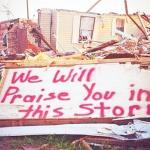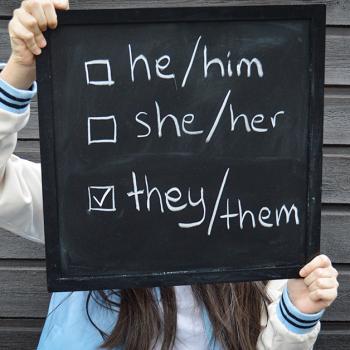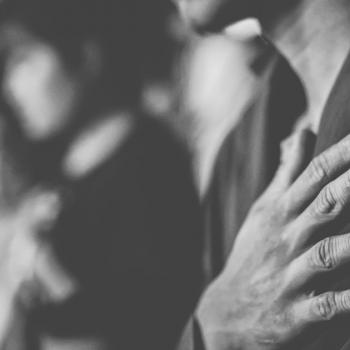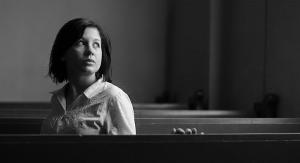 Despite the fact that I’m knocking on the door of a full decade without faith in Jesus, from time to time I’m still surprised by the surges of emotion that accompany a memory of what life was like back when I still believed. At one particular moment last weekend I was nearly consumed by the feels still associated with a Christian song I hadn’t heard in nearly twenty years.
Despite the fact that I’m knocking on the door of a full decade without faith in Jesus, from time to time I’m still surprised by the surges of emotion that accompany a memory of what life was like back when I still believed. At one particular moment last weekend I was nearly consumed by the feels still associated with a Christian song I hadn’t heard in nearly twenty years.
It was from an old album by The Kry, an alternative Christian rock band that my Baptist church friends had probably never heard of, but which for some reason featured heavily in my most passionate moments of religious fervor as a teenager. Upon hearing the first few chords of the song, I was transported instantaneously to my younger days, soaked as they were with ambition to become the person most committed to Jesus of all his followers in history.
It’s amazing how inextricably linked are music and memory.
I had to shut the song off only seconds into the first verse because I was driving and I was afraid I’d soon be unable to steer the vehicle, I was so overcome. You have to understand…my faith wasn’t just an incidental element of my life when I was younger, it was who I was. It was everything to me. My identity sprang almost exclusively from my desire to know and love Jesus more fully than any other human alive. I drank quite deeply of that kool-aid, and I was thoroughly happy in the thrall of God’s redeeming love for me.
Of course at this point I’ve resolutely left that life behind me, but occasionally I am still struck with a memory that inundates me with the emotions of my younger days, reminding me just how central to my life was this one specific relationship—my relationship with God. It was everything to me, and sometimes I forget how devastating to me was the loss of it all. It was a really heavy blow.
There’s a Downside, Too
I’ve written before about how I can identify with Buzz Lightyear in the movie Toy Story. He came out of the box fully programmed to believe he was an elite intergalactic space ranger when in reality he was only a child’s plaything that ran on batteries. When the reality of his existential situation finally crashed in upon him, he nearly lost the will to live. If he wasn’t a space ranger, then what was he? Just a toy? How utterly depressing.
That’s kind of what it’s like when you lose your faith and realize your entire life and self-concept were predicated on a myth, a fabricated narrative meant to serve someone else’s fantasy but not based at all in real life. It’s a lot to take.
Read: “How Toy Story Illustrates When I Lost My Faith“
Not too long after I moved my blog to Patheos, TIME magazine picked up a post I wrote entitled “What I Gained When I Lost My Religion,” and I’ll confess that was a nice little ego trip for a few days, there. But even as I published it, I knew I would need to do a follow-up post that honestly wrestled with which things I feel I lost when I gave up my religion.
I’ve already written about that a little bit, but after this weekend’s emotional deluge I realized I could do a bit more to flesh out just how much I feel like I’ve lost in letting go of my faith.
Is that a depressing direction to go? Maybe, but I guarantee there are a number of people who can identify with exactly what I’m talking about, and maybe I want them to know that they’re not alone.
[Incidentally, this would probably be a helpful place to restate that I’ve recently launched a private (read: hidden) Facebook group for those of you who need just such a thing in order to have a place to honestly wrestle with your own doubts or apostasy far removed from the controlling, judgmental gaze of those who would feel threatened by your departure from the faith. If you’d like to know more about that group, feel free to message me (godlessindixieblog at gmail) or else look me up on Facebook.]
Today I’d like to enumerate a handful of things you lose when you say goodbye to the kind of faith that framed and guided my life for nearly 20 years. Someone out there will benefit from learning they’re not the only one who feels this way, and at the end I’ll do my best to suggest what’s next for someone who finds himself or herself in a predicament similar to mine.
A sense of social belonging permeates one’s entry into the faith since religion is ultimately a social construct, an institution if you will. One’s departure from the faith is an entirely different matter, however. As I’ve explained before, leaving one’s faith is nearly nothing like entering it, solitary and countercultural as this step usually is for those who still inhabit highly religious social spaces.
Related: “Leaving My Religion Was Nothing Like Entering It“
If you were as serious as I was in my younger days, you know how traumatizing this change can be, and it doesn’t at all help that the people closest to you believe at some level that it’s only right you should suffer for this change of heart and mind. To them, your apostasy is dangerous and detrimental to your soul, your eternal destiny. They can’t help but feel like they’ve lost you to a terminal disease, and they speak to you as if you’ve been diagnosed with just such a thing. If things continue to get worse, maybe you’ll come back into the fold, and at some level that makes them welcome your suffering despite their noblest desires to alleviate your pain.
So without further ado, here is a short list of things I often feel whenever something like a song transports me back to what I felt like when I still believed that all this stuff wasn’t made up.
Seven Things I Lost
1. I miss believing that Someone is always there.
Loneliness is probably the most central struggle of human consciousness. Humans are nothing if not egocentric, but being the center of your own universe can be a pretty solitary experience. No one knows you or your story quite like you yourself do, but religion offers a sense that there is Someone Else who knows everything that you do about you, and actually a little bit more. He’s like the 3rd person omniscient character in the novel of your life.
We all need people to come alongside us to help us curate the museum of memories that make up our own life’s narrative, but unfortunately over time people will come and go. They don’t always stay forever. Friends have a falling out, and sometimes even spouses do, too. Parents and friends pass away, and eventually you get to the point where you and you alone know enough of your own story to retell it. But religion provides you with a Person who is there from the first of your days until the last, provided you continue to believe in him, of course (why does it have to be a him?). That can be incredibly painful to part with.
If you’ve never entrusted your every thought, hope, and dream to a Person who you believed was always there for you, I don’t suppose you’ll appreciate how hard it is to lose that. But for some of us, it’s like losing our very best friend.
2. I miss believing that all of life has an appointed purpose.
Companionship isn’t the only thing human beings need. We also need purpose. We are rational beings, and we like to believe there is some overarching goal to our lives, even if we have to create it ourselves. One of the great things about religion is that it situates your life’s narrative into a larger story that spans the entire cosmos.
My particular version of the Christian religion had this in spades. The circles I ran in made much of the language in the letter to the Ephesians where it suggests that the most important thing in the universe is unfolding through the life of the Church. Keep in mind this didn’t mean any church in particular, since in real life churches are a disappointing mess. No, this meant The Church in Abstraction, far removed from reality and idealized into an almost platonic “form” that exists only in an invisible realm. The Church Invisible, they call it…which helps, since invisible things are immune to scrutiny.
But it wasn’t just the Church that had cosmic purpose. As a member of that institution, I believed my life had individual purpose as well. I woke up every morning believing that Someone existed who controlled all things and who also cared a great deal about what happened to me in particular. I’d say this was egocentric of me, except that in the Christian worldview, God can be this focused on every human alive at the same time. Don’t try to figure it out, they told us. It’s not going to make sense, but that doesn’t mean it’s wrong.
Fallacy or not, my belief in this idea gave me a deep and abiding calm about absolutely everything that happened to me. No matter how stressful or worrisome a situation was, I had this bedrock belief that ultimately things would turn out okay because I had been assured that God was looking out for me, and that in all things He works for the good of those who love him (see Romans 8:26-28).
That’s a pretty deep well of comfort to draw from, and losing that was a serious blow to my emotional life, especially once I accumulated the kinds of problems that only an adult responsible for a bunch of other people could possibly know.
3. I miss believing in magic.
Real life can be pretty disappointing. When you’re a kid, you dream of things that are larger than life, and it turns out religion allows you to hang on to that for as long as you live. Just like Santa Claus brought you things while you were asleep (don’t wake up too early or he’ll evaporate!), so does God deliver blessings in your life as long as you don’t scrutinize them too closely.
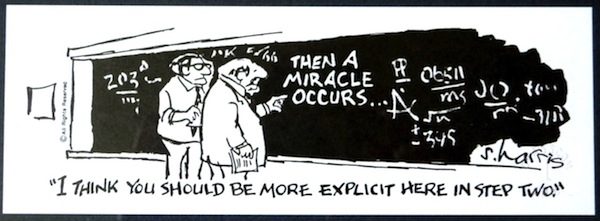
With faith, things don’t have to add up. In fact, it’s actually better if they don’t. Things not making sense only proves that they are of supernatural origin, like the concept of a Being who is three persons but somehow still just one, or an infallible book written by fallen people.
Oddly enough, this creates an expandable space for hope in your thinking. If things don’t have to make sense, you can always hold on to hope that things will work out through an act of a deus ex machina, an unexplainable dramatic occurrence that owes its outworkings to a magical force you will never be able to explain. A miracle, if you will.
Losing a belief in miracles can really take a toll on your psyche. It was really, really nice to believe that problems could sometimes be solved just by wishing they would be, maybe even out loud to an invisible Person. Over here in the real world, real problems require real solutions, and that is way more complicated. Sometimes I wish I could go back to the time when I naively thought things were simpler.
4. I miss believing that life goes on after you die.
Consciousness has this funny way of making us think we should always exist…forever. Never mind the fact that we didn’t exist before our parents bumped uglies and created us, and never mind the fact that it didn’t bother us at all when we didn’t yet exist. For some reason we can’t shake the idea that it will be unpleasant for us to stop existing, even though we won’t be around to feel bad about it.
But it was also lovely to believe that we would one day be reunited with the people we love. I wish I could still believe this. It was a deep comfort upon the loss of those who matter to me. It brings great comfort in death. It’s no wonder people cling to this so adamantly, and it’s one of the first things people bring up when they discover we no longer believe in afterlives.
“Are you suggesting that I’ll never see ______ again? How could you SAY that?!”
Chances are, we never said it. They made the connection themselves and they are deeply hurt by the idea. They have my deepest sympathies (I miss my loved ones, too), but strong feelings don’t make things true. Shouldn’t we know this by now without being reminded?
5. I miss community.
This one’s almost too painful to type out. I once had a community of people who thought I was wonderful. I was probably on too much of a pedestal, truth be told. But even after continually removing myself from it, I still had a real-life supportive community that lived within driving distance of me, and I got to see them on a regular basis. In fact, I got to see my favorite ones as often as three times a week (Sunday morning, Sunday night, and Wednesday night).
Now they are gone. I mean, they’re still there, mostly. But my presence makes them incredibly uncomfortable now, and I can’t sit through the things they’re hearing from the pulpit or the stage without wanting to stand up in the pew and start deconstructing the whole framework because it’s based on so many inaccuracies it would take the whole service just to scratch the surface of it all. Needless to say, I don’t fit in with them anymore.
And there wasn’t a new community waiting for me when I got out. Granted, I’ve worked at assembling a virtual community through social media, but it’s just not the same. Sometimes you need to be embraced, and I don’t mean metaphorically. Sometimes you need someone to catch a movie with, or to let your kids play with their kids. You need a regular social context in which you can live out your life while others cheer you on and give you the moral support that all human beings need.
Facebook is nice, but it’s also maddening, and often depressing. Lately it’s been mostly angering. And I miss having a place I could go where I could forget about my problems and be assured that things were going to work out, somehow.
6. I miss believing that my mistakes will one day be overridden by grace, by mercy, and by redemption.
I miss believing that my insufficiencies and insecurities found their ultimate remedy in the person and work of Jesus. That was a lovely belief to inhabit, and I often wish I still had reason to believe it was based in reality. But in retrospect I’ve come to realize how much those insecurities are simply woven into our DNA as a species. At this point in our evolution, they’re a feature rather than a bug, and few things are more fundamental to our self-concept. We know we haven’t yet fully arrived at what we could be as individuals and as a species. But it’s up to you how you frame it—how you understand who you are in the midst of collective human history.
As Bishop Shelby Spong once said, “We are not fallen angels but emerging beings.” The longer I live, the more that sentence burrows its way into the way I understand my existence. I think it may be the best reshaping of our view of human nature I’ve ever found since leaving the stifling atmosphere of evangelical Christianity.
7. I miss believing I was fortunate enough to have been born in exactly the right country to belong to the only true religion on the planet.
And more than that, to the exact denominational family of churches that understood what God really wanted, unlike all those poor saps that keep getting it all wrong. In a way, leaving my religion was an unavoidable consequence of growing up and expanding my own frame of reference from the tiny enclave of my provincial upbringing to a global mentality which keeps in mind that there are billions of people on this planet who don’t see the world the same way that I do. If you still believe everyone thinks the same way as you, you have not really grown up yet into adulthood. I don’t care how many birthdays you’ve had.
Honorable Mentions
I asked a group of online friends to weigh in about what they miss most, and besides the things I’ve listed above, there were several more things repeated that I’d like to throw in here as well. Incidentally, if you don’t have a group like this to support you, I hope you’ll shoot me a note and ask to be a part of it.
Here is what else people say they miss:
- Music that connects you to an auditorium full of people, and to a sense of transcendence. There’s nothing like singing in unison (or harmonizing) with hundreds or thousands of other people in the same room. There just aren’t words to capture it.
- A sense of belonging to a larger tradition that spans generations and connects you to people who have long since gone.
- Certainty. About pretty much anything.
- The assured belief that justice will ultimately prevail. No matter how many bad actors appear in the world, it was nice to believe that after it’s all over, things would be set right, no matter how hopelessly screwed up they appear.
- Not having to actually pay for your mistakes because something is there to erase them.
- Potlucks. Religious people can make a mean casserole.
- Holidays that meant something besides getting extra days off of work. And once again the music.
- Having a consistent place to go—a brick-and-mortar physical space (or even one out in nature, as in a camp) where you could count on finding a place of peace. It made for a sense of location that human beings need.
- Being able to look at family members without detecting the unmistakeable traces of disappointment and regret in their faces whenever they look at you.
I’m sure there are more. But already my emotions are taxed to their limit from even thinking about all of this. The struggle is real, y’all.
In Pursuit of Reality
I’d rather believe in things I have good reason to believe are true, even if it’s not as exciting or emotionally gratifying as what I was taught to believe as a child. Reality for me is reward enough, and from this point onward it becomes my responsibility to adjust to the way things are and to find a way to pursue happiness and fulfillment within that reality.
In the end, isn’t that how living things survive and thrive in the world? They learn to adjust to the way the world is rather than the way they want the world to be.
Maybe well-constructed fantasies reinforced by ancient institutions go a long way toward making people happy. I’m willing to concede that. If I’m being honest, there are days I think I’d be willing to take the blue pill like Cypher was going to do in The Matrix. Some days I wish I could forget what I’ve learned. But that’s not really how it works.
If we are ever going to evolve as a species, we’re going to have to learn to find motivation and inspiration in things that are actually real. But the growing pains of getting from point A to point B take a serious toll on those of us who find ourselves stepping out in front of the crowds we used to run with. It can be a very lonely place.
In time we are going to have to do better at building communities with like-minded people so that we can reinforce those traits and aims that would truly move us forward as a species. It’s not an easy task, however, as the last few years of my own experience has undeniably taught me. People can be real buttholes, in case you didn’t know it yet. They’re like fertilizer…when you spread them out, they’re pretty useful. But put them all together into a single place and it just starts to smell bad.
We also are going to need better music, something we can sing in a room full of people to feel connected to something larger than ourselves. John Lennon‘s Imagine is starting to get old.
Eventually we’re going to have to figure out how to do this. Or in lieu of that, maybe we have to learn how to find the handful of people who truly “get” who we are and band together to keep each other on track, looking out for each other’s well-being as best as we can. Maybe it can’t be done on a large scale. But I can at least start by building my own personal community, learning to lean on them and be there for them as much as I can. You make your own family, as they say.
I’d like to hear from you, though. What would you add to this list? What do you miss most about the days when you still believed, and what do you think we need most in order to move forward from where we are today? We’re all listening…
[Image Source: Adobe Stock]
________
If you’re new to Godless In Dixie, be sure to check out The Beginner’s Guide for 200+ links categorized topically on a single page.
And if you like what you read on Godless in Dixie, please consider sponsoring me on Patreon, or else you can give to help me keep doing what I’m doing. Every bit helps, and is greatly appreciated.


